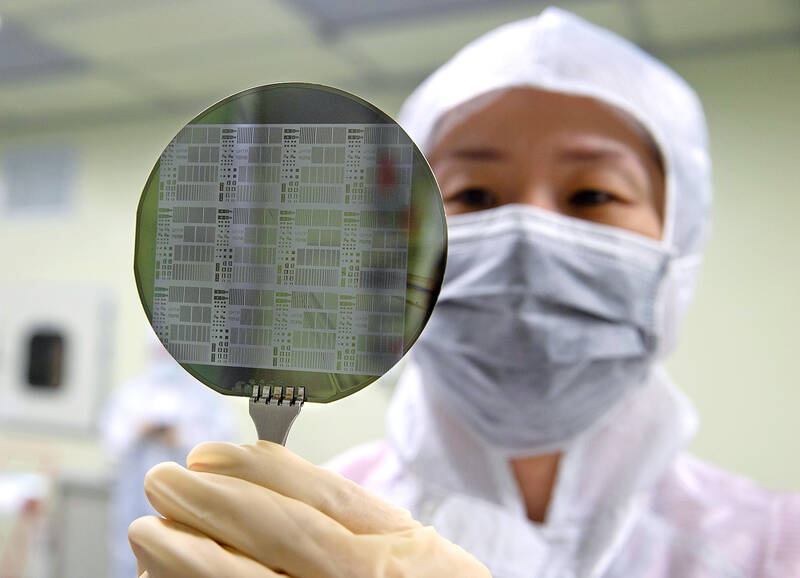The National Science and Technology Council is slated to reveal a critical technologies list soon to safeguard Taiwan’s technological competitive edges and national security in the wake of the US’ warning about mounting risk from China, Minister of Economic Affairs Wang Mei-hua (王美花) said yesterday.
“We have been in discussions for some time,” Wang told reporters in response to a question about whether Taiwan would follow in the steps of the US and tighten its grip over exports of semiconductor and other key technologies.
“The National Science and Technology Council is to release the list regarding critical technologies soon. Taiwan is to impose severe curbs on those technologies,” Wang said. “Taiwan’s critical technological competencies and national security will be our main consideration.”

Photo: CNA
The ministry has recognized foundry, semiconductor packaging and testing, as well as LCD technologies as some of the nation’s critical technologies with strategic importance. Local semiconductor and LCD companies are faced with the ministry’s strict scrutiny and assessment before being granted approval to invest advanced technologies in China, or to conduct equity transfers to Chinese peers.
The National Science and Technology Council said a special task force is scheduled to convene a meeting by the end of this year to identify new core and critical technologies and to impose curbs on the exports of those key technologies. That will be a further step taken by the council more than half a year after the new regulation on the designation of national core critical technologies had taken effect in April.
The council said it aims to prevent technology leaks to China, including Hong Kong and Macau, or foreign hostile forces, to prevent them from undermining the nation’s national security, industrial competitiveness or economic development.
Semiconductors, agriculture, aerospace, and information and communications technology are expected to be on the list, National Security Council Secretary-General Wellington Koo (顧立雄) told Nikkei Asia earlier this week.
The EU is to assess whether semiconductors, artificial intelligence, quantum technologies and biotechnology pose a risk to the bloc’s economic security, which could lead to curbs on exports or investments in third countries such as China, Reuters reported.
US Secretary of Commerce Gina Raimondo told a US Senate Committee on Commerce, Science and Transportation hearing on Wednesday that reports of Huawei Technologies Co’s (華為) chip breakthrough were “incredibly disturbing.”
Raimondo said more resources were needed for export controls enforcement and that the department should be granted more power to check whether any technology transactions could pose national security risks.

Vincent Wei led fellow Singaporean farmers around an empty Malaysian plot, laying out plans for a greenhouse and rows of leafy vegetables. What he pitched was not just space for crops, but a lifeline for growers struggling to make ends meet in a city-state with high prices and little vacant land. The future agriculture hub is part of a joint special economic zone launched last year by the two neighbors, expected to cost US$123 million and produce 10,000 tonnes of fresh produce annually. It is attracting Singaporean farmers with promises of cheaper land, labor and energy just over the border.

US actor Matthew McConaughey has filed recordings of his image and voice with US patent authorities to protect them from unauthorized usage by artificial intelligence (AI) platforms, a representative said earlier this week. Several video clips and audio recordings were registered by the commercial arm of the Just Keep Livin’ Foundation, a non-profit created by the Oscar-winning actor and his wife, Camila, according to the US Patent and Trademark Office database. Many artists are increasingly concerned about the uncontrolled use of their image via generative AI since the rollout of ChatGPT and other AI-powered tools. Several US states have adopted

A proposed billionaires’ tax in California has ignited a political uproar in Silicon Valley, with tech titans threatening to leave the state while California Governor Gavin Newsom of the Democratic Party maneuvers to defeat a levy that he fears would lead to an exodus of wealth. A technology mecca, California has more billionaires than any other US state — a few hundred, by some estimates. About half its personal income tax revenue, a financial backbone in the nearly US$350 billion budget, comes from the top 1 percent of earners. A large healthcare union is attempting to place a proposal before

KEEPING UP: The acquisition of a cleanroom in Taiwan would enable Micron to increase production in a market where demand continues to outpace supply, a Micron official said Micron Technology Inc has signed a letter of intent to buy a fabrication site in Taiwan from Powerchip Semiconductor Manufacturing Corp (力積電) for US$1.8 billion to expand its production of memory chips. Micron would take control of the P5 site in Miaoli County’s Tongluo Township (銅鑼) and plans to ramp up DRAM production in phases after the transaction closes in the second quarter, the company said in a statement on Saturday. The acquisition includes an existing 12 inch fab cleanroom of 27,871m2 and would further position Micron to address growing global demand for memory solutions, the company said. Micron expects the transaction to